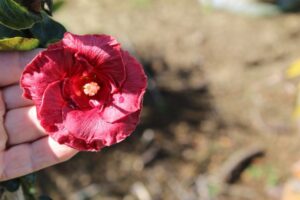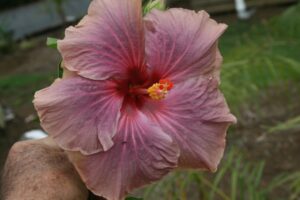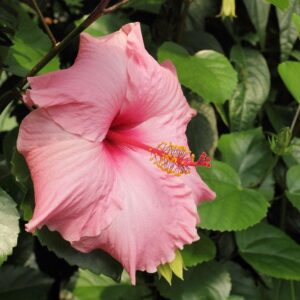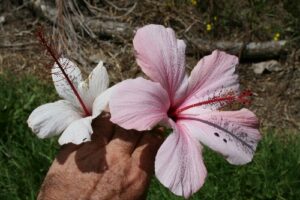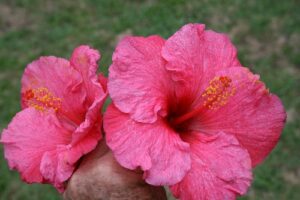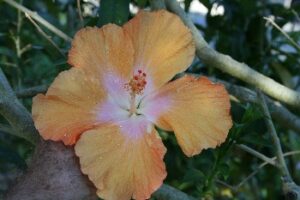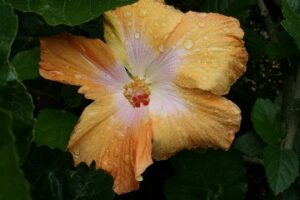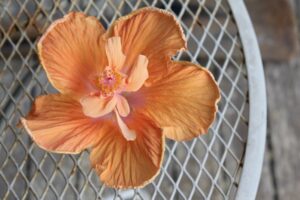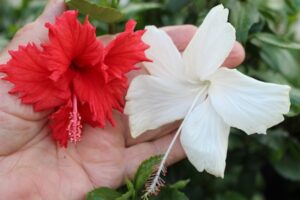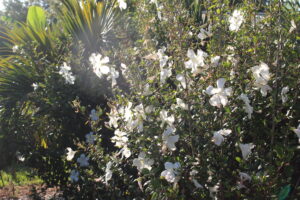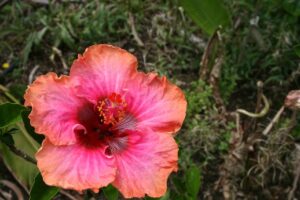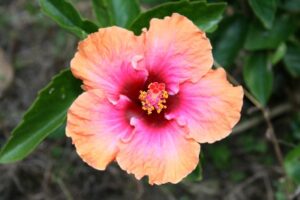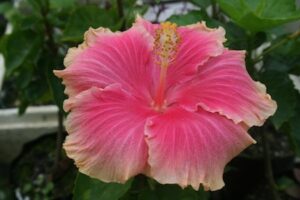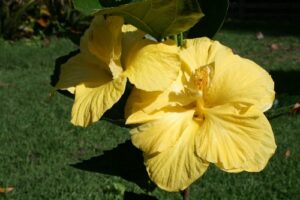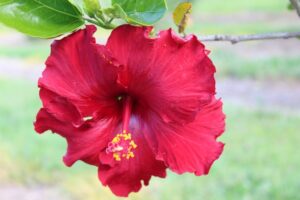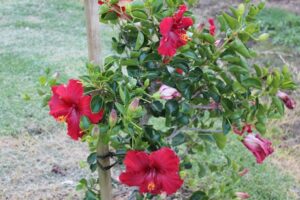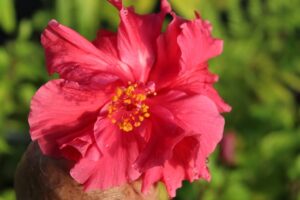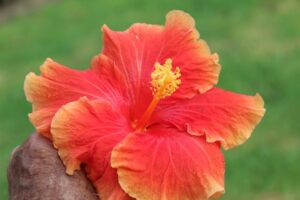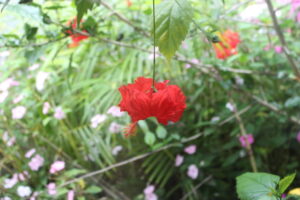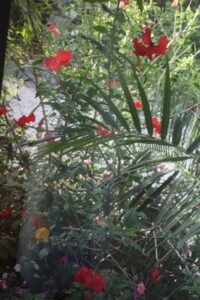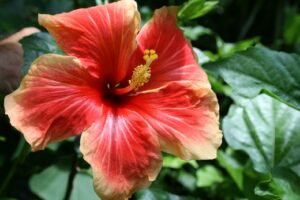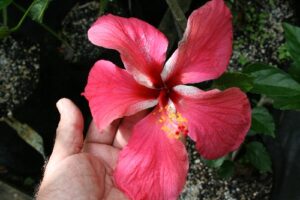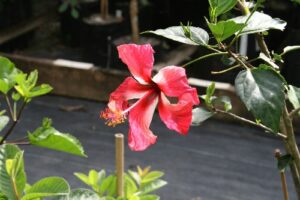Hibiscus Plants for Sale
I have rewritten this section as of January 2026.
Note: my own hibiscus selections are in a separate section for “exclusive Nestlebrae hibiscus”.
The page you are on now dealt in the past with traditional flowers, commercially available, often for many years already, in New Zealand. It’s not going to have major extra and new content on it in the future.
For a long time I have been intending to still offer a few of these sorts of hibiscus. It’ll be ones that I still grow here, and thus can get cuttings from them easily, that I will be using to keep this page going into the future.
But my real goal has been to select from the hibiscus flowers and plants that I have grown totally from my own selections and efforts. I have been importing hibiscus seeds for myself to experiment with since about 2008. They’ve come from about half a dozen different breeders whose work I’ve seen over the years since 2008. Two of them have been central to my current hibiscus collection, one on Moorea in Tahiti, and one in the eastern United States in an area with cold winters, so he does his work under protection in greenhouses.
Prices vary
My standard price is $25 for a young plant of the sort traditionally available in NZ, and in PB6 to PB12 sizes.
For yet newer cultivars from my own resources, patience is required. Watch this space! Well, actually, look particularly at the “Exclusive Nestlebrae Hibiscus” section. So watch that space! I am trialling many new plants grown from seed imported from those various breeders overseas.
When should you plant hibiscus?
Roughly, October onwards, once the ground is clearly warming up. These are definitely warm climate, rather than temperate, plants. You wouldn’t plant new tomato plants in winter. Hibiscus, once established, will tolerate our winters in milder climates around NZ, but they don’t grow much then, and flower size and colour can really suffer. By August, flower sizes might be only a quarter, or less, depending on the variety, of what they would be in summer. Moreover, some of the complex new hibiscus lose their glorious colours in our winters. Here’s an example. It’s one I raised from seed that was bred in Tahiti. One of the pictures was taken in August- guess which one!

Hibiscus arnottianus
Wilder’s White
This is a species from elevation in Hawaii. Simple white flowers with long pink-red stamens and paler pink veins. That’s it in the combination photo of two flowers just below this entry you are reading. Resistant to root rot. Do not prune hard, unlike the hybrids commonly seen in gardens in NZ.
In stock? YES
Hibiscus cv. ‘Agnes Gault’
Agnes Gault
Another traditional sort of hibiscus often grown in New Zealand in the past. A strong grower in our conditions.
In stock? YES
Hibiscus cv. ‘Apple Blossom’
Apple Blossom
The late Russell Fransham looked at this and said his belief was that it was a hybrid between Hibiscus arnottianus on the left, and some unknown pink cultivar. It is exceedingly vigorous, with lots of flowers displayed well on a bush that will go up to about 4 metres tall if you don’t prune it. My original cutting came from a big bush that grew all over part of the public telephone box at Tauranga Bay which is just around from the opening of the Whangaroa Harbour in the Far North of NZ, so that’s how I identified it. Then I met Bob Rivers-Smith, then the hibiscus specialist in NZ. From his copious records he came up with ‘Apple Blossom’, and this was immediately an appropriate fit. Several years later still I learned that an even more original name for it is ‘Lillian Wilder’, but you’ll find it as Apple Blossom often in Australia too. My ageing brain has decided to stick with what I can remember!
In stock? YES
Hibiscus cv. ‘Ben James’
Ben James
One of the favorite clear red forms in my collection. Lots of single flowers in a very attractive light to medium red colour, with a little ruffling on the petal surfaces. Bright and strong. In stock? NO
Hibiscus cv. ‘Brother Anthony’
Brother Anthony
Subdued and subtle in lovely apricot shades moving into pinkish tones around a white centre. Reported to be hardy under northern NZ conditions.
In stock? YES
Hibiscus cv. ‘Crown of Warringah’
Crown of Warringah
A variety with an Australian reference to the name, and it’s been around for quite a few years now. Reliable, and relatively hardy for a hibiscus. Pale, distinctive orange, heading towards being a double, with the characteristic central tuft.
In stock? NO
Hibiscus cv. ‘Dainty White’
Dainty White
Probably the best known of the Dainty series of small flowered hibiscus, this is a pure white, very simple flower. The plant is not large, and the leaves are small, but it does hold plenty of flowers. Good in with complementary plants. It is seen next to the equally small flowered ‘Psyche’. Photographed in early November the red flower is the first since winter. It’s outdoors, so duller and smaller than it will be in summer. Then the two would be similar in size. The second photo is of two bushes backlit near each other in Summer 2021-22.
In stock? NO
Hibiscus cv. ‘Erin Rachel’
Erin Rachel
A small, but complexly coloured, modern cultivar. The flowers may be small, but they are almost jewel-like in colours ranging from red through pink, with orange edges. It flowers very well for me, and seems to be a bit more resilient than some of the other modern hybrids. [PVR registered]
In stock? NO
Hibiscus cv ‘Hawaiian Sunset’
Hawaiian Sunset
A prolific producer of flowers in a simple pink and yellow-cream two tone arrangement. Hardy and reliable. In stock? NO
Hibiscus cv. ‘Macdelveon’s Yellow’ (syn. ‘New Zealand Yellow Hibiscus’)
Macdelveon’s Yellow
A Jack Clark hybrid (i.e. bred in Auckland by the late Jack Clark) with semidouble, strong mid-yellow flowers on a vigorous, upright bush. Excellent if you want a very clear, strong yellow. In stock? NO
Hibiscus cv. ‘Molly Cummings’
Molly Cummings
Much admired and grown by many New Zealanders over the years, this is a lovely, robust, large flowered, glorious example of a strong red hibiscus. It has black tonings in the flower, especially on the first day each flower is open. I’ve tried repeatedly but haven’t yet captured the quality of this flower in a photo…so far!
In stock? NO
Hibiscus cv. ‘Pride of Hankins’
Pride of Hankins
A vigorous, fast-growing plant with a double or semi-double flower in bright raspberry pink shades. It is an old cultivar from Florida, and it has been widely used as an understock on which to graft other varieties since it is such a good grower. However, it is a variety with its own virtues- tons of flowers, and grows strongly.
In stock? NO
Hibiscus cv. ‘Prince of Orange’
Prince of Orange
A gorgeous orange flower with gold edging. If you want a hibiscus with really strongly orange colour, then this could be the one for you. (Bred by Jack Clark in NZ)
In stock? NO
Hibiscus cv. ‘Psyche’
Psyche
‘Psyche’ (pronounced rather like “Sigh-kee”) is a beautiful, vibrantly red, small hibiscus flower. The bush itself is not small. However, the flower size makes ‘Psyche’ seem more dainty than the hibiscus bushes traditionally grown in Aotearoa. The petals recurve, and the petiole is long. This has led to it becoming a classic flower for hair decoration throughout the Pacific.
In stock? YES
Hibiscus cv. ‘Royal Highness’
Royal Highness
An intriguing flower. It’s a large one, pale apricot on the edges, with the colour deepening to orange-red in the centre. One of John’s real favourites because it performs outdoors so reliably.
In stock? YES
Hibiscus cv. ‘The Bride’
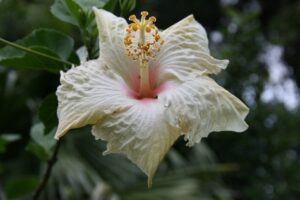
The Bride displays lots of creamy white, suffused with pale pink going in to the centre, medium sized blossoms. Quite a vigorous bush. The fabric of her dress (i.e. the petal surface) is intriguingly ruffled. Softly attractive in her prime! In stock? NO
Hibiscus cv. ‘Versicolour’
Versicolour
Another strongly growing, now rather oldfashioned (but none the worse for that!) Fijian hibiscus. Again this one was identified for me by Bob Rivers-Smith. Desirable and floriferous.
In stock? YES

